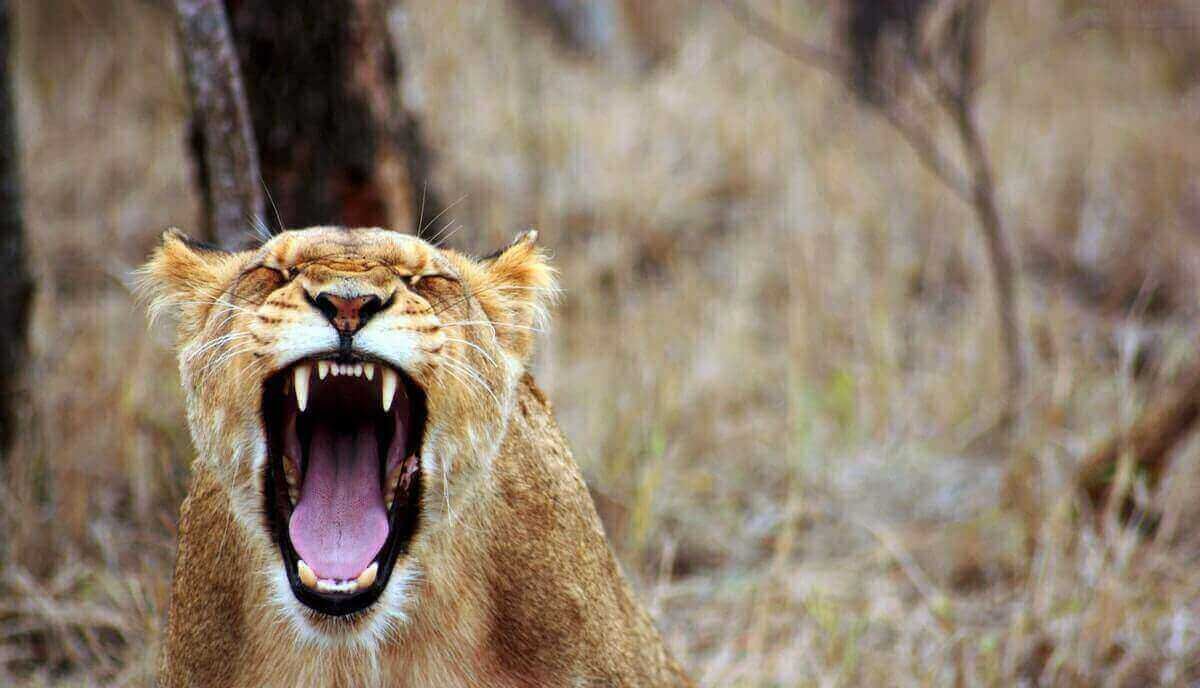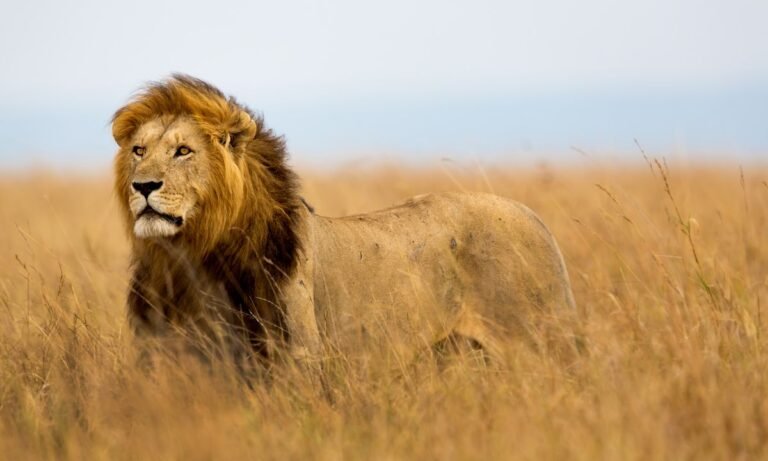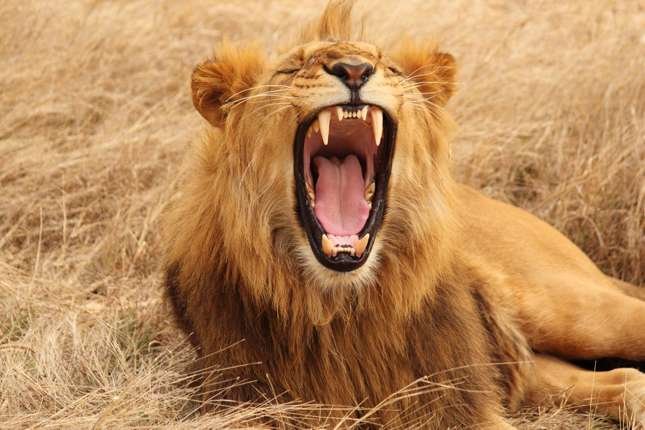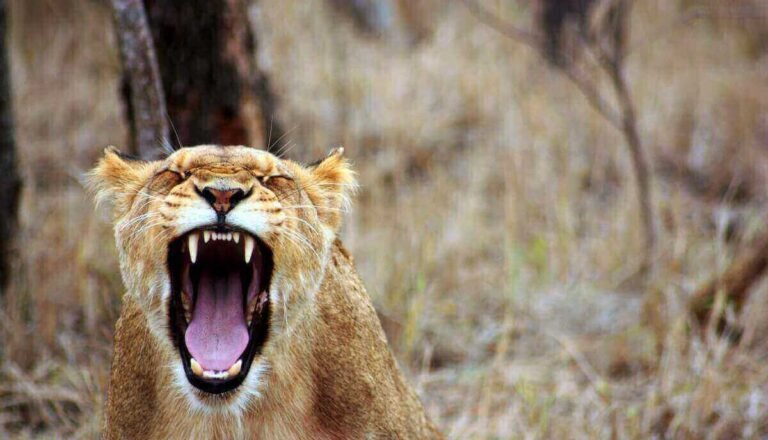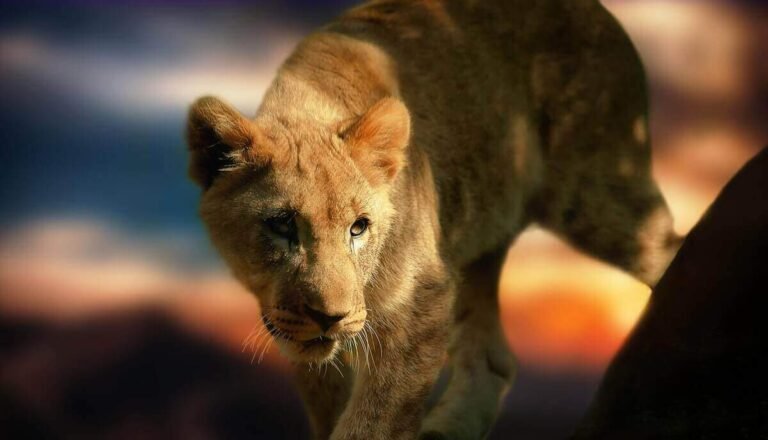Why Do Lions Roar? Everything You Need to Know!
Lions are one of the most majestic animals in the world. They are also one of the loudest, with their trademark roar being able to carry for up to 8km! But why do lions roar?
It turns out that there are a few reasons… Lions use roaring as a way to communicate with other members of their pride. Roaring can be used to make announcements, such as when a male lion is looking for a mate, or to warn off intruders who enter their territory.
In addition to communicating with others, roaring also helps lions strengthen the bonds within their pride. By roaring together, they reaffirm their social ties and unity. Finally, roaring is simply part of what makes being a lion so much fun!
It’s an expression of joy and excitement, and often happens when lions are playing or interacting with each other. So next time you hear a lion’s roar, remember that there’s more to it than just making noise – it’s actually an important part of how these amazing animals live and interact with each other.
Lions are the king of the jungle for a reason: they’re huge, powerful, and intimidating. But why do they roar? It turns out that there are a few reasons why these big cats might let out a mighty roar.
For one, roaring is a way to establish dominance over other lions. If there’s another lion who is getting too close to your territory or your pride, a well-timed roar can scare them off and remind them who’s boss. Additionally, roaring can also be used as a form of communication between members of a pride – it’s sort of like their version of “checking in.”
By roaring, lions can let others know where they are and what they’re up to.
Of course, sometimes lions just feel like roaring because it feels good! Letting out a big roar can be cathartic and release some built-up tension – kind of like screaming into a pillow when you’re angry.
So next time you hear a lion roaring, remember that there could be any number of reasons behind it – but mostly, they just feel like being loud!
Ask the Expert: Why do lions roar?
Why Do Lions Have the Loudest Roar?
The lion’s roar is so loud because it has the deepest vocal cords of any land animal. Its vocal cords are about 18 centimeters long, which is almost twice as long as a human’s. This allows the lion to make a much louder sound than other animals.
What is the Purpose of a Lions Roar?
The lion’s roar is one of the most intimidating sounds in the animal kingdom. It can be heard up to five miles away and is used to warn off intruders, communicate with other lions, and declare ownership over a territory. The sound is produced by vibrating the vocal cords in the lion’s larynx, which amplifies the noise as it passes through the mouth and nose.
Why Do Lions Make Grunting Noises?
Lions are known for their loud roars, but they also make a variety of other vocalizations, including grunts. So why do lions grunt?
There are a few reasons why lions might grunt.
One reason is that they use grunts as a form of communication. For example, a lion might grunt to let another lion know that it is nearby and wants to interact. Lions also use grunts to express different emotions, such as anger, frustration, or contentment.
Grunts can also be part of a lion’s mating call. Male lions will often let out a series of deep grunts when they are trying to attract females. The females will usually respond with softer grunts of their own.
So there you have it! There are several reasons why lions might make grunting noises – communication, emotions, and mating calls. Next time you hear a lion grunt, you’ll know what it’s trying to say!
How Powerful is a Lions Roar?
A lion’s roar is one of the most powerful sounds in the animal kingdom. It can be heard up to five miles away and is used to communicate with other lions, warn off intruders, and claim territory. A lion’s roar is so loud because it has a unique vocal anatomy that amplifies sound waves.

Credit: www.youtube.com
Why Do Lions Roar in the Morning
Lions are one of the most vocal animals in the animal kingdom. They use a variety of sounds to communicate, including roars, grunts, moans, and mews. Roars are the most impressive of these sounds, and they can be heard up to five miles away.
Lions typically roar in the morning and evening hours, although they can roar at any time of day.
There are several reasons why lions might roar in the morning. One reason is that roaring is a way to announce their presence and claim their territory.
By roaring, lions let other animals know that they are in the area and that they should stay away. This is especially important during mating season, when lions need to establish their territory in order to attract mates.
Another reason why lions might roar in the morning is to scare away potential predators or competitors who might be looking for a meal or looking to take over their territory.
Roaring also helps lions bond with each other and strengthen social bonds within their pride.
So why do lions roar? There could be many reasons, but one thing is for sure- it makes them feel good!
Why Do Lions Roar at Their Prey
Lions are one of the most feared predators in the animal kingdom. Their massive size and powerful muscles allow them to take down their prey with ease. But why do lions roar at their prey before they attack?
There are a few reasons why lions might roar at their prey before attacking. For one, roaring is a way to intimidate their prey and get them to submit without a fight. Roaring also allows the lion to communicate with other members of its pride, letting them know where it is and that it’s about to hunt.
Lastly, roaring might help the lion scare off other potential predators that might be lurking nearby. By making itself known, the lion is essentially saying “stay away – this kill is mine!”
So next time you see a lion roaring on TV or in person, remember that there’s more to it than just a scary noise.
There’s strategy involved in that big cat’s hunting technique!
Why Do Female Lions Roar
Female lions are the true rulers of the pride. Though they may not be the biggest or strongest members, they play an important role in leading and protecting their family. So why do female lions roar?
There are a few reasons. First, roaring is a way to communicate. Female lions will often roar to let other animals know that they are in the area and to warn them to stay away.
This helps protect her cubs from potential danger.
Second, roaring is a way to assert dominance within the pride. By letting out a powerful roar, she is sending a message to others that she is in charge and should be respected as such.
Lastly, roaring is simply fun! Female lions enjoy showing off their strength and power by releasing an ear-piercing roar. It’s one of the many ways they express themselves and have a good time.
Why Do Lions Roar Repeatedly
Lions are the only cats that roar, and they do so for a variety of reasons. One is to communicate with other lions—to announce their presence, mark their territory, or summon help in times of trouble. Another reason is intimidation: by roaring loudly, a lion can make itself appear larger and more dangerous than it really is, discouraging potential enemies from attacking.
In addition to roaring, lions also use a number of other vocalizations to communicate, including grunts, moans, growls, and mews. And like all cats, they have an impeccable sense of smell that they use to keep track of one another and their surroundings.
Do Lions Roar Louder Than Tigers
Do Lions Roar Louder Than Tigers?
The lion is the king of the jungle, and its regal status is reflected in its impressive roar. But does this big cat make the loudest noise of all?
Let’s find out if lions roar louder than tigers.
Lions are known for their powerful roars, which can be heard up to five miles away. The frequency of a lion’s roar falls between 90 and 110 Hz, while the tiger’s growl has a lower frequency range of about 60 to 80 Hz.
So in terms of sheer volume, it seems that lions have the upper hand.
But there’s more to consider than just volume when it comes to these two big cats’ roars. For one thing, tigers tend to make shorter roars than lions do.
And while a lion’s roar may lack some of the high-pitched frequencies that carry over long distances, its low tones are still very formidable – especially when you factor in the fact that male lions can weigh up to 550 pounds!
In conclusion, it seems that both lions and tigers have pretty impressive roars – but if we had to choose one as the winner, we think it would be the mighty lion!
The Roar of a Lion Meaning
Do you know what it means when you hear a lion roar? It can mean different things depending on the situation. Here are some examples:
A lion roaring in the wild usually means he’s asserting his dominance over his territory. He’s saying, “This is my land and I’m the king here!” If another lion wanders into his territory, he’ll likely get a face full of Lion’s breath – aka a big ol’ roar – to scare him off.
Sometimes a lion will also roar when he’s hunting. He does this to intimidate his prey and try to get them to freeze up so he can more easily take them down.
Lions also sometimes use their roars to communicate with other members of their pride.
So if you hear a bunch of lions roaring all at once, they might be planning their next meal or discussing where everyone should sleep that night.
And finally, sometimes a lion just feels like roaring because it feels good! Just like humans, animals need to let out a good scream every now and then (but hopefully not at 3am like our neighbors’ dog…).
So there you have it! The next time you hear a lion roar, think about what it might mean based on the context. And if you’re ever lucky enough to see one in person, maybe give them a little respect by not disturbing their dinner or taking over their turf!
Do Lions Roar When They are Hungry
Lions have been known to roar when they are hungry. This is because roaring is a way for them to communicate their needs and desires to other lions. When a lion roars, it is usually trying to let others know that it is looking for food.
Roaring can also be a way for lions to show their dominance over other members of their pride.
Lions Roar Facts
The lion is the second largest cat in the world, after the tiger. lions can weigh up to 550 pounds and grow up to 11 feet long! Males have manes that they use to attract mates and intimidate rivals, while females do not have manes.
Both male and female lions roar to communicate with their pride members. A lion’s roar can be heard up to five miles away!
Conclusion
Lions are the only big cats that regularly roar, and they do so for a variety of reasons. Primarily, roaring is a way for lions to communicate. Male lions will often roar to announce their presence and stake out their territory, while females tend to roar more when they’re seeking mates or calling their cubs.
Roaring also serves as a warning to other animals, letting them know that the lion is nearby and should be avoided.
So why do lions roar? It’s primarily a form of communication, whether it’s announcing their presence, staking out territory, or warning other animals of their proximity.

